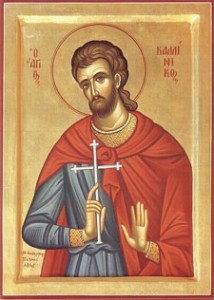 The Gospel reading for July 29 is Matthew 20: 1-16, the Parable of the Laborers in the Vineyard.
The Gospel reading for July 29 is Matthew 20: 1-16, the Parable of the Laborers in the Vineyard.
This parable can have several layers of meaning. It has been seen, for example, as a description of the various times in life, represented by the hours of the day it mentions, at which people might come to know God. Some have faith from their early youth, some find it in adulthood, and some discover it when they reach old age.
We can also look at the parable as Christ’s direct challenge to us and to our attitude toward other people. In verses preceding the parable (19: 27), Peter has asked the Lord: “Lo, we have left everything and followed You. What then shall we have?” Jesus answers that everyone who has left anything for His sake will have it restored a hundredfold. He adds, “But many that are first will be last, and the last first.” The parable follows.
Jesus compares the kingdom of heaven to a householder who hires laborers to work in his vineyard early in the day, offering to pay one denarius to each. A few hours later, he hires more workers and tells them they will receive “whatever is right.” He does the same with other groups of workers as the day goes on.
When the day ends, the householder’s steward pays the laborers, beginning with those who started at the latest hour. They each receive a denarius. Seeing this, those who started at the earliest hour protest: “These last worked only one hour, and you have made them equal to us…”
The householder reminds them they have received the agreed-upon wage. He adds, “Am I not allowed to do what I choose with what belongs to me? Or do you begrudge my generosity?” (This last sentence is also translated, “Or is your eye evil because I am good?”) Then again comes the statement, “So the last will be first, and the first last.”
The question is there to consider: “Do you begrudge My generosity?” To begrudge is to keep score, to resent the fact that someone we consider less deserving gets as much as we do. The parable calls us to give up keeping score.
On this day we remember a saint who didn’t keep score. The martyr Callinicus was a Christian native of Cilicia, in Asia Minor, who was arrested for refusing to worship idols. The pagan governor saw that people admired Callinicus’ courage, so he exiled him, not wishing to risk the crowd’s anger by executing him.
The soldiers guarding Callinicus on the arduous journey into exile became overwhelmed with thirst. He might have let these pagan servants of a pagan governor suffer, considering them unworthy of the mercy of his God. Instead he prayed, and God sent water trickling from a rock to refresh them.
Kontakion – Tone 2
You worthily inherited joy on high, Callinicus, for aflame with love for Christ you bravely endured the fire. As you stand before Him, never cease to intercede for us all.
Callinicus didn’t begrudge God’s kindness, and perhaps that day some pagan soldiers saw for the first time what the true God is like. Perhaps they also saw that a Christian, even when life seems unfair, doesn’t keep score.
